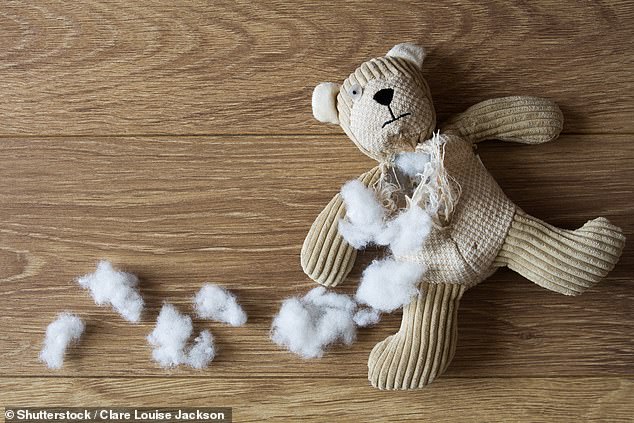Why do we love our teddy bears so much? Scientists say it doesn’t matter what our childhood toys look like; it’s the emotional connection that counts
- What makes our children’s toys so special has nothing to do with appearance
- Instead, experts say it’s all down to the comforting power they give us
Whether it was a stuffed animal or something that looked like a rag, most of us have had a teddy bear at some point in our lives.
But what made them so special had nothing to do with their appearance, according to one study.
Researchers have discovered that the comforting power of teddy bears comes from the emotional bond a person has with them, rather than their appearance.
A team from the University of Aix-Marseille in France recruited 395 people with an average age of 18 for their study.
Participants were asked to view a selection of teddy bears and rate their sensory appeal, including how they looked and felt.
Researchers have found that the comforting power of teddy bears comes from the emotional connection a person has with them, rather than their appearance (stock image)
The collection of teddy bears included their own teddy bears, those of other people in their group, and a selection of teddy bears provided during the experiment.
Analysis found that when assessing the comfort scores of others’ teddy bears, the most important factors were softness, coat length, scent, body volume and visual appeal.
But when it came to participants’ own teddy bears, no visual features were linked to comfort scores.
Participants found their own teddy bears much more comforting than teddy bears from other people or the teddy bears presented in the experiment.
Other people’s smiling bears were perceived as slightly more comforting than non-smiling bears, but this made no difference to the comfort scores of the participants’ own bears.
Writing in the Journal of Positive Psychology, the researchers said: ‘The comforting power of the teddy bear has often been claimed in many previous studies without knowing its underlying determinants.

Analysis found that when assessing the comfort scores of others’ teddy bears, the most important factors were softness, coat length, scent, body volume and visual appeal (stock image)
‘This research aims to identify characteristics of teddy bears that influence their comforting power (and) we also tested the effect of ownership.
‘Our research showed that the emotional bond you share with a teddy bear is a dominant factor.
‘The physical and sensory characteristics had no effect on the comfort scores of participants rating their own bears.
‘The emotional bond that is built with a teddy bear makes it unique and incomparable.’
